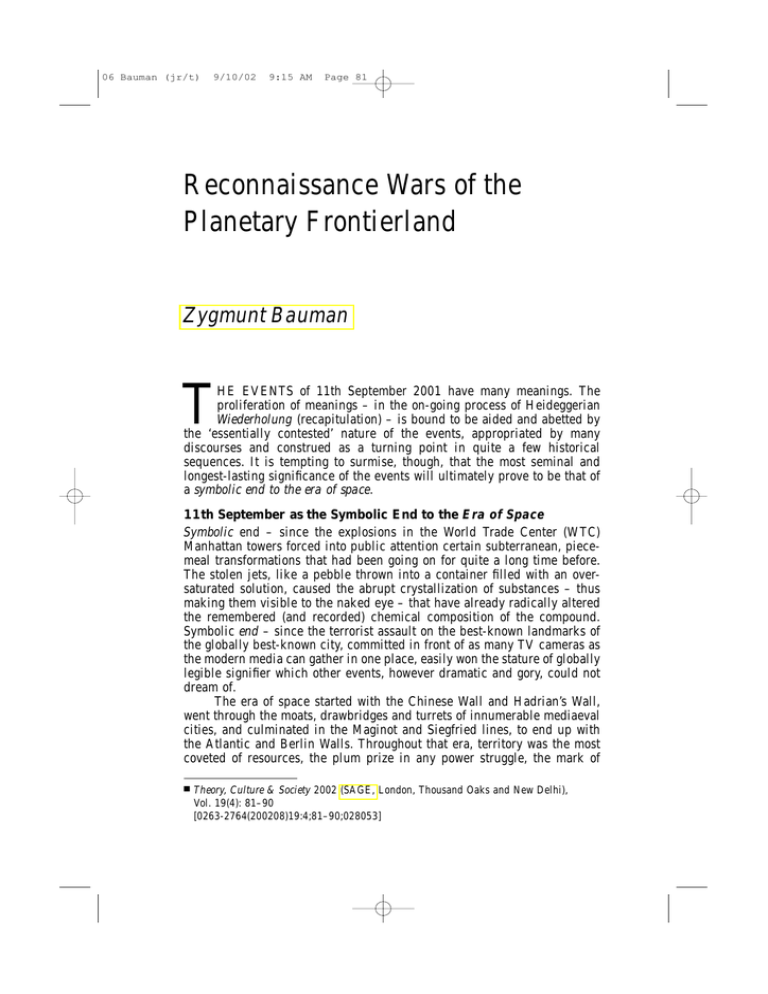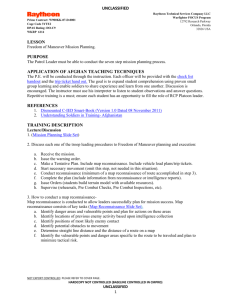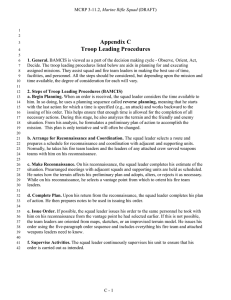T Reconnaissance Wars of the Planetary Frontierland Zygmunt Bauman
advertisement

06 Bauman (jr/t) 9/10/02 9:15 AM Page 81 Reconnaissance Wars of the Planetary Frontierland Zygmunt Bauman T HE EVENTS of 11th September 2001 have many meanings. The proliferation of meanings – in the on-going process of Heideggerian Wiederholung (recapitulation) – is bound to be aided and abetted by the ‘essentially contested’ nature of the events, appropriated by many discourses and construed as a turning point in quite a few historical sequences. It is tempting to surmise, though, that the most seminal and longest-lasting significance of the events will ultimately prove to be that of a symbolic end to the era of space. 11th September as the Symbolic End to the Era of Space Symbolic end – since the explosions in the World Trade Center (WTC) Manhattan towers forced into public attention certain subterranean, piecemeal transformations that had been going on for quite a long time before. The stolen jets, like a pebble thrown into a container filled with an oversaturated solution, caused the abrupt crystallization of substances – thus making them visible to the naked eye – that have already radically altered the remembered (and recorded) chemical composition of the compound. Symbolic end – since the terrorist assault on the best-known landmarks of the globally best-known city, committed in front of as many TV cameras as the modern media can gather in one place, easily won the stature of globally legible signifier which other events, however dramatic and gory, could not dream of. The era of space started with the Chinese Wall and Hadrian’s Wall, went through the moats, drawbridges and turrets of innumerable mediaeval cities, and culminated in the Maginot and Siegfried lines, to end up with the Atlantic and Berlin Walls. Throughout that era, territory was the most coveted of resources, the plum prize in any power struggle, the mark of Theory, Culture & Society 2002 (SAGE, London, Thousand Oaks and New Delhi), Vol. 19(4): 81–90 [0263-2764(200208)19:4;81–90;028053] 06 Bauman (jr/t) 9/10/02 9:15 AM Page 82 82 Theory, Culture & Society 19(4) distinction between the victors and the defeated. You could know who was the victor by watching who stayed on the battlefield once the fighting fizzled out. But, above all, territory was throughout that era the prime guarantee of security. It was in the terms of the length and depth of the controlled territory that the issues of security were pondered and tackled. The era of space was the time of ‘deep hinterland’, Lebensraum, cordons sanitaires – and the Englishmen’s homes that were their castles. Power was territorial, and so were privacy and freedom from the interference of power. ‘Chez soi’ was a place with borders that could be made tight and impermeable, with trespassing effectively barred and prevented, and to which entry could be strictly regulated and controlled. Land was a shelter: a place to which one could escape and inside which one could lock oneself up, hide and feel safe. The powers one escaped and hid from stopped at the borders. This is all over now, and has been over for some considerable time – but that it is indeed over has become dazzlingly evident only since 11th September. The events of 11th September made it obvious that no one can any longer cut themelves off from the rest of the world. Annihilation of the protective capacity of space is a double-edged sword: no one can hide from blows, and blows can be plotted from however enormous a distance. Places no longer protect, however strongly they are armed and fortified, nor do they give foolproof advantage to their occupiers. Strength and weakness, threat and security have become now, essentially, extraterritorial issues that evade territorial solutions. The sources of the present-day insecurity are located in what Manuel Castells dubbed the ‘space of flows’ and cannot be accessed, let alone dealt with, as long as the measures undertaken to cure or mitigate that insecurity are confined to but one or a selected few of the places it affects (think for instance of the huge demand for family nuclear shelters in times of the ‘assured mutual destruction’ threat, or of the unstoppably rising popularity of ‘gated communities’ in times of the increasing urban violence and crime). The now ever-present threat of a terrorist attack 11th September-style was on the cards for a long time, due to the global insecurity massively generated inside the uncolonized, politically uncontrolled, thoroughly deregulated, extraterritorial ‘space of flows’. But the materialization of that threat, in the form it took, brought the untouchable within touch, the invisible within sight, the distant to inside the neighbourhood. It thereby allowed the translation of the threat from the difficult-to-master language of global insecurity (a semantically impoverished language with few if any syntactic rules) into the all-too-familiar and easily understood language of personal safety that is in daily use. In the longer run, that translation may prove good news: it may assist the comprehension of the link between the two, and even enable the reverse translation – of local safety concerns into global security issues. For the time being, though, one thing made clear is the present-day mutually assured vulnerability of all politically separated parts of the globe. The way in which the events of 11th September will be 06 Bauman (jr/t) 9/10/02 9:15 AM Page 83 Bauman – Reconnaissance Wars 83 recorded in our shared – planetary – history depends on the strategy conceived and deployed to confront, and mitigate, that vulnerability. In a sober assessment of the post-11th September developments, David Held (2002) does not find them particularly encouraging. He observes ‘strong temptations to simply put up the shutters and defend the position of some nations and countries only’. There is some chance to ‘strengthen our multilateral institutions and international legal agreements’, but there is also a possibility of responses that ‘could take us away from these fragile gains toward a world of further antagonisms and divisions – a distinctively uncivil society’. Held’s overall summary is anything but optimistic: ‘At the time of writing the signs are not good.’ Our consolation, though (the only consolation available, but also – let me add – the only one humankind needs when falling on dark times), is the fact the ‘history is still with us and can be made’ (2002: 74–88). Global Space as the New Frontierland The degree of vulnerability can no longer be measured by the size of the arsenal of high-tech weapons once developed with the (by now oldfashioned) territorial wars, gains and conquests in mind. As Eric le Boucher (2001) summed it up, the new wisdom that has been forced upon us by 11th September is that ‘the world cannot divide itself into two separate parts – one rich and secure behind its modern anti-missile system, the other left . . . to its wars and “archaisms” ’ . After 11th September, it has become clear that ‘far-away countries can no more be left to their anarchy’ – that is, if the rich and allegedly secure want to stay rich and be secure in fact. The global space has assumed the character of a frontierland. In the frontierlands, agility and cunning count for more than a stack of guns. In the frontierlands, fences and stockades mark intentions rather than realities. The efforts to give the conflicts a territorial dimension, to pin the divisions and mutual enmities to the ground, seldom bring results. Suspected from the start to be ultimately ineffective, they tend to be half-hearted anyway: wooden stakes signal the lack of self-assurance manifested by stone or concrete walls. Capturing the territory they occupied yesterday does not mean today’s victory over the adversaries, let alone the ‘termination of hostilities’. Most certainly, it does not assure a secure tomorrow. In the course of interminable frontierland warfare, trenches are seldom dug. The adversaries are known to be constantly on the move. Their might and nuisance-making ability lie in their speed, and the inconspicuousness and randomness of their moves. For all practical intents and purposes, in a frontierland adversaries are extraterritorial. The manifestation of our changed existential condition took us unawares – just as the change itself took us unprepared. The sacrosanct division between dedans and dehors, that charted the realm of existential security and set the bridgeheads and targets for future transcendence, has been all but obliterated. Il n’y a pas du ‘dehors’ any more. . . . We are all ‘inside’, with nothing left outside. Or, rather, what used to be ‘outside’ has 06 Bauman (jr/t) 9/10/02 9:15 AM Page 84 84 Theory, Culture & Society 19(4) entered the ‘inside’ – without knocking; and settled there – without asking permission. The bluff of local solutions to planetary problems has been called, the sham of territorial isolation has been exposed. Don’t ask where the frontierland is – it is all around you, in your town, on the streets you walk. Frontierlands, at all times, have been known as, simultaneously, factories of displacement and recycling plants for the displaced. Nothing else can be expected of their new, global variety – except of course the new, planetary scale of the production and recycling problems. Let me repeat: there are no local solutions to global problems – although it is precisely the local solutions that are avidly sought, though in vain, by the extant political institutions, the sole political institutions that we have collectively invented thus far and the only ones we have. Embroiled as these institutions have been from the start and throughout their history in passionate efforts (Herculean in their intention, Sisyphean in practice) to seal the union of state and nation with territory – it is no wonder that all such institutions have become and remained local, and that their sovereign power of feasible (or, indeed, legitimate) action is locally circumscribed. Refugees as the Waste of Global Frontierland The tested ways of acting being no longer available, we seem to be left with no good strategy for handling the newcomers. In times when no cultural model can authoritatively and effectively claim its superiority over competing models, and nation-building coupled with patriotic mobilization has ceased to be the principal instrument of social integration and states’ selfassertion, cultural assimilation is no longer on the cards. On the other hand, deportations and expulsion make dramatic and rather disturbing television, and are likely to trigger a public outcry and tarnish the international credentials of the perpetrators – and so most governments prefer to steer clear of the trouble, if they can, by locking the doors to all who knock asking for shelter. The present trend to drastically reduce the right to political asylum, accompanied by the stout refusal of entry to ‘economic migrants’ (except at those few and transient moments when business threatens to travel where labour is, unless labour is brought where business wants it to be), signals no new strategy regarding the refugee phenomenon – but the absence of strategy, and the wish to avoid a situation in which that absence causes political embarrassment. Under the circumstances, the terrorist assault of 11th September helped the politicians enormously. In addition to the usually brandished charges of sponging on the nation’s welfare and stealing jobs,1 refugees can now stand accused of playing a ‘fifth column’ role on behalf of the global terrorist network; they are prime targets on which the anguish generated by the suddenly revealed ‘personal safety’ aspect of existential insecurity can be condensed, unloaded and dispersed. At long last, there is a ‘rational’ and morally unassailable reason to round up, incarcerate and deport people whom one no longer knows how to handle while not wanting to take the 06 Bauman (jr/t) 9/10/02 9:15 AM Page 85 Bauman – Reconnaissance Wars 85 trouble to find out. In the US, and perhaps soon in Britain (judging from the increasingly belligerent postures paraded publicly by the top figures of the British ruling team), under the convenient banner of the ‘anti-terrorist campaign’, foreigners are being promptly deprived of the essential human rights that until now have withstood all vicissitudes of history since Magna Carta and Habeas Corpus (if only the unwelcome foreigners were confined to a separate territory, as in Palestine under Israeli occupation, they could face, as they do courtesy of the current Israeli rulers, the prospect of being enclosed in a gigantic walled-off ghetto, having been first bombarded/famished/humiliated into submission). Foreigners can now be indefinitely detained on charges against which they cannot defend themselves since they are not told what they are. As Martin Thomas (2001) acidly observes, from now on, in a dramatic reversal of the basic principle of civilized law, the ‘proof of a criminal charge is a redundant complication’ – at least as far as the foreigners are concerned. The doors may be locked; but the problem won’t go away, however tight the locks. Locks do nothing to tame or weaken the forces that cause displacement and make humans into refugees. The locks may help to keep the problem out of sight and out of mind, but not to force it out of existence. Refugees have become, in a caricatured likeness of the new power elite of the globalized world, the epitome of that extraterritoriality in which the roots of the present-day precariousness of the human condition – first on the list of present-day human fears and anxieties – are sunk. Those fears and anxieties, seeking other outlets in vain, have rubbed off on the popular resentment and fear of refugees. These fears and anxieties cannot easily be defused or dispersed in a direct confrontation with that other embodiment of extraterritoriality – the global elite, drifting beyond the reach of human control, too powerful to be confronted. Refugees, on the other hand, are a sitting target for unloading the surplus anguish. Floating Coalitions and Confluent Enmities In the frontierland, both alliances, and the frontlines that separate enemies are, like the adversaries themselves, in flux. Troops and paramilitaries readily change their allegiances, while the dividing line between nonbelligerents and those in active service is tenuous and easily shifted. As far as coalitions go, there are no stable marriages – only admittedly temporary cohabitations of convenience. Trust is the last thing to offer, loyalty the last to expect. To paraphrase Anthony Giddens’s memorable concept, one could speak here of ‘confluent alliances’ and ‘confluent enmities’. The first starts in the expectation of momentary gain or convenience, and falls apart or is broken off once satisfaction fades away. The second – even if burdened with a long history of animosity – tends to be nevertheless joyfully suspended (for a time at least) if cooperation with the enemy promises more benefits than a showdown. Starting the war against the Taliban, Donald H. Rumsfeld, the American Secretary of Defense, warned that the war ‘will not be waged by 06 Bauman (jr/t) 9/10/02 9:15 AM Page 86 86 Theory, Culture & Society 19(4) a grand alliance united to defeat an axis of hostile powers. Instead, it will involve floating coalitions of countries, which may change and evolve’ (2001: 6). His deputy, Paul Wolfowitz, backed such a strategy, vindicating the return to frontierland conditions (or rather helping to reshape the global space along frontierland lines), when he anticipated ‘shifting coalitions’, predicting that in the coming war ‘some nations might help with certain operations, and others could be called upon in a different capacity’. As he summed up the new military wisdom – ‘to be effective, we have to be flexible. We have to be adaptable’ (in International Herald Tribune, 2001). And the operation that followed was flexible indeed – though, inevitably, flexibility cut both ways, and was soon proved to mean something considerably less straightforward than what Rumsfeld or Wolfowitz meant it to mean. ‘Floating coalitions’ were a reality for some time before they were officially written into the handbooks of Pentagon war strategy. As Richard J. Aldrich reports in his forthcoming book (Aldrich, forthcoming): In the 1980s Washington’s secret services had assisted Saddam Hussein in his war against Iran. Then, in 1990, the US fought him in the Gulf. In both Afghanistan and the Gulf, the Pentagon had incurred debts to Islamic groups and their Middle Eastern sponsors. By 1993 these groups, many supported by Iran and Saudi-Arabia, were anxious to help Bosnian Muslims . . . and called in their debts with the Americans. Bill Clinton and the Pentagon . . . repaid in the form of an Iran-contra style operation – in flagrant violation of the UN security council arms embargo . . . The operation was arranged with the help of the Afghan mojaheddin (many of whom were later reincarnated as Taliban and Al-Quaida) and the proIranian Hizbullah. Under frontierland conditions, any war against some terrorists or other can be won, given enough weapons and enough money to bribe ‘floating’ and ‘flexible’ allies into the struggle. But the war against terrorism is unwinnable as long as the global space retains its ‘frontierland’ character. Keeping the coalitions ‘floating’ or ‘shifting’ is itself one of the paramount factors contributing to the perpetuation of the frontierland nature of global space. The strategy of temporary coalitions of transient interest, allied to the concomitant avoidance of firmly institutionalized structures empowered to elicit permanent obedience to universal rules, and to resistance against the establishment of long-term, mutually binding and authoritatively supervised commitments – stands between the present-day frontier land and any prospect of replacing it with a global, politically serviced and controlled order. The Promoters and Beneficiaries of the New Global Disorder It is easy to understand why such a ‘flexible coalition’ strategy, and the ruling out of long-lasting and universally binding structures, may be tempting for all who hope to benefit from the resulting uncertainty by relying 06 Bauman (jr/t) 9/10/02 9:15 AM Page 87 Bauman – Reconnaissance Wars 87 on their competitive superiority, and who would not wish to share the anticipated gains with the less resourceful and fortunate. The point is, though, that the strategy can serve more than one master and, when applied, sets up the conditions that facilitate its reciprocation. The perpetuation of ‘global disorder’ serves the purposes of the terrorists as well as it does the world-domination of those who wage war against them. The war against terrorism is unwinnable because both sides have vested interests in the perpetuation of frontierland conditions. On this one point at least, both sides see eye to eye, even if they speak in different voices. There is, one may say, an un-gentlemanly agreement, which neither side of the ‘war against terrorism’ shows any intention of breaking. Both sides militate against the constraints imposed on the newly gained freedom to ignore or push aside the ‘laws of the countries’ whenever such laws feel to them inconvenient. This one coalition – the coalition against equitable, universally binding and democratically controlled global order – seems to be the sole one that staunchly resists ‘flexibility’ and shows no inclination to ‘float’. A couple or so centuries ago, when the pre-modern ancien régime (of societies sliced into poorly coordinated, often separatist localities, and of law fragmented into an aggregate of privileges and deprivations) fell apart, blazing the trail for state and anti-state terrorisms, and making society a dangerous place, a vision of the new, supra-local, nation-state-level of social integration emerged. No comparable vision has emerged so far in our times, when the modern version of ancien régime (the planet sliced into sovereign nation-states with no universal law binding them all) is falling apart. There is no ‘politics of global order’ in sight, boasting a vision wider than that of an average police precinct (the sole vision being the one of rounding up, incarcerating and otherwise disempowering such agents whose way of exploiting the licence made possible by the frontierland condition has been declared illegitimate). Most certainly, little thought and even less political will have been dedicated, thus far, to the possible shape of democratic control over the forces currently emancipated from the extant institutions of legal and ethical control, free to deliver blows of their choice to the targets of their choice. As Clausewitz put it, war is but a continuation of politics by other means. Of the war declared by the United States and Britain on terrorism, Jean Baudrillard (2001) said that it was but a continuation of the absence of politics by other means. In the absence of global politics and global political authority, violent clashes are only to be expected. And there will be always someone eager to decry the act of violence as terrorist – that is, illegitimate, criminal and punishable. The expressions ‘terrorism’ and ‘war on terrorism’ will remain hotly, essentially contested concepts, and the actions they prompt inconclusive. Contemporary Conflicts as Reconnaissance Battles In a fluid milieu, where old routines are quickly eroded and new ones have no time to acquire shape (let alone to solidify), groping in the darkness 06 Bauman (jr/t) 9/10/02 9:15 AM Page 88 88 Theory, Culture & Society 19(4) pierced but by a few random shafts of light (a procedure ennobled in the fashionable sociological rhetoric by the name of ‘reflexivity’) is the sole available way of acting. All action is experimental; but not in the orthodox sense of the ‘experiment’ (that is, of a carefully designed test meant to prove or disprove the existence of a predicted/ suspected/guessed regularity), but in the sense of a random search for a lucky move. Action proceeds through trials, errors, new trials and new errors – until one of the attempts brings a result that could, under the circumstances, pass for satisfactory. In the absence of routine and tested, apodictically commanded or authoritatively endorsed roads to success, such experiments need be, and tend to be, excessively abundant. Most of the moves are anticipated and feared to be unsuccessful, and the sole service they may be reasonably expected to render is to eliminate a part of the mind-boggling multitude of possibilities. Profusion of trials does not guarantee success – but it sustains hope that, among the many failed and wasted attempts, one at least will happen to be on target. Prominent instances of such experimental actions are the reconnaissance battles – arguably the most common category of warfare (and violence in general) in our global frontierland. In military practice, ‘reconnaissance battles’ (or reconnaissance-through-battle) have ‘the sifting of the possible from the impossible’ as their sole purpose. Reconnaissance battles precede the setting of the war objectives and the design of war strategy. They are meant to supply the data for the selection of realistic goals and the planning of military actions that follows. In the case of reconnaissance battles, units are not sent into action in order to capture the enemy territory, but to explore the enemy’s determination and endurance, the resources the enemy can command and the speed with which such resources may be brought to the battlefield. The units are ordered to lay bare the enemy’s strong points and weaknesses, and the shrewdness and miscalculations of the enemy commanders. Analysing the course of a reconnaissance battle, staff officers can hopefully make intelligent guesses concerning the enemy’s power of resistance and capacity for a counter-attack, and so suggest war plans deemed realistic. Reconnaissance battles bear striking resemblance to ‘focus groups’, the modern politicians’ favourite means of anticipatory intelligence-gathering before deciding on the next move (testing of the electorate’s possible reactions to the steps considered, but not yet taken before irreparable damage is caused if an ill-advised or insufficiently pondered step is revealed to be unpopular and resented). Indeed, a good deal of the current military thinking, and the armament policies that thinking inspires, takes the form of simulated reconnaissance battles, conducted inside the army staff offices or during military exercises on the experimental ranges instead of on the temporarily unavailable battlefields. Reconnaissance battles are the principal category of violence in an under-regulated environment. The current case of ‘under-regulation’ is the result of, first, the progressive collapse of the structures of authority that, 06 Bauman (jr/t) 9/10/02 9:15 AM Page 89 Bauman – Reconnaissance Wars 89 until recently, had been thought intractable and bound to be suffered meekly, however oppressive, and – second – the emergence of new sites of action in which the question of legitimate authority has been never put, let alone settled. The collapse of old authority structures affects all levels of social integration, but is particularly conspicuous and consequential at the two levels – the global and the life-political levels. Both have acquired a heretofore unprecedented importance in the totality of factors shaping the conditions under which lives are nowadays conducted, and both lack traditions that could be invoked and relied upon whenever new and untested, but hopefully correct and success-promising patterns of action are sought. On the planetary plane, the political void that has replaced the world tightly structured by the mutually contained expansion of two power blocks currently provides another natural ground for reconnaissance battles. Political void is a constant invitation to a bargain-by-force. Neither the outcome of the global game, nor its rules, are predetermined, and there are no global political institutions capable of systematically limiting the range of the players’ choices and causing them to respect the limits. The response to the terrorist assault of 11th September has yet further exposed the essential lawlessness of the global frontierland, and the irresistible seductiveness of the catch-as-catch-can tactics. The condition of lawlessness, eagerly exploited in all reconnaissance battles, self-perpetuates with every successive attempt to turn it to that side’s advantage, whatever side undertakes it. Each act of violence leads to retaliatory actions that invite responses in kind. As the balance of power and the range of opportunities shift, yesterday’s animosities are discarded or suspended for the sake of manning newly emerged front-lines. Enemies turn overnight into allies and allies into enemies, as new ad hoc coalitions cut across old ad hoc coalitions and the timely changing of sides is undertaken in the hope of plum prizes. And so the waging of reconnaissance battles in the hope of fathoming the opportunities offered by continuous instability becomes an increasingly tempting strategy, gladly resorted to, with a similar zeal and acumen, by those concerned with preserving their privileges and those bent on gaining them alike. Gregory Bateson’s ‘schismogenetic chains’ need no external boosting to perpetuate themselves: they expand and self-replicate, drawing all the procreative energy they need from their own inner logic. Between Euripides and Sophocles This Gordian knot cannot be untangled; it can be only cut – just as the interminable recycling of vendettas in Euripides’ Hellas was cut through by Sophocles’ rule of law. The cycle of violent reconnaissance battles may grind to a halt only if there is nothing left to reconnaître; if the universally binding and enforceable rules of conduct that allow no unilateral opting out, and disallow the use of inverted commas when international laws and world opinion are invoked, are put in place. 06 Bauman (jr/t) 9/10/02 9:15 AM Page 90 90 Theory, Culture & Society 19(4) Note 1. A charge eagerly resorted to, with great profit, by an ever widening range of contemporary politicians across the political spectrum, from Le Pen, Pia Kjersgaard or the Vlaam Bloc on the far right to the growing number of such ‘mainstream’ and ‘established’ political figures that define themselves as centre, centre-right or ‘left of centre’. The French presidential elections were preceded by a veritable auction, conducted in public over many months by Chirac and Jospin as they vied to be the person seen as ‘toughest on crime and immigration’ (see Herzberg and Prieur, 2002). Inanely, fighting the ‘extreme right’ or populist causes by reinforcing the common belief that immigration is the true cause of existential insecurity and stopping immigration true medicine for insecurity, is widely seen by the politicians as the proper defence of mainstream politics. References Aldrich, Richard J. (forthcoming) The Hidden Hand: Britain, America and Cold War Secret Intelligence. London: John Murray. Baudrillard, Jean (2001) ‘L’Esprit du terrorisme’, Le Monde 3 Nov.: 11. Held, David (2002) ‘Violence, Law and Justice in a Global Age’, Constellations March: 74–88. Herzberg, Nathaniel and Cécile Prieur (2002) ‘Lionel Jospin et le “piège” sécuritaire’, Le Monde 6 May: 23. International Herald Tribune (2001) ‘US Keeps NATO Outside’, 27 Sept. le Boucher, Eric (2001) ‘Le 11 septembre, tournant dans le mondalisation’, Le Monde 25 Oct.: 17. Rumsfeld, Donald H. (2001) ‘Creative Coalition-Building for a New Kind of War’, International Herald Tribune 28 Sept.: 6. Thomas, Martin (2001) in The Guardian 26 November. Zygmunt Bauman is Professor Emeritus at the Universities of Leeds and Warsaw. His most recent book is Society under Siege (Polity Press, forthcoming).



